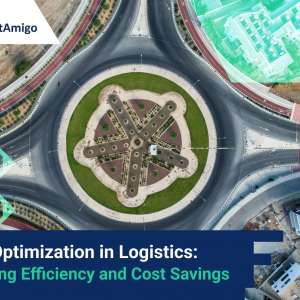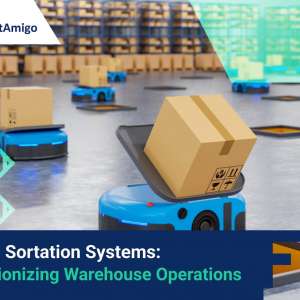Electric trucks have emerged as one of the greatest advancements in urban logistics in recent years. With their environmentally friendly nature and potential to reduce carbon emissions, electric trucks are reshaping the future of freight transportation. As businesses strive to achieve a more sustainable supply chain, the adoption of electric trucks becomes increasingly crucial. In this article, we will explore the applications, advantages, and challenges of electric trucks in logistics, as well as their potential to transform the industry.
Author Name:Tiffany Lee – Marketing Analyst at FreightAmigo
Want to compare the best Express, Air Freight, Sea Freight, Rail Freight & Trucking rates so as to have better control on cost?
The Rise of Electric Trucks: A Glimpse into the Future
According to a report by PwC, the use of electric trucks is expected to become widespread in the coming years. By 2030, zero-emission vehicles (ZEVs) powered by batteries or fuel cells are projected to account for one-third of all trucks in Europe, North America, and Greater China. The study also highlights that by 2035, they will make up around 70% of the market share in these regions. The growing demand for electric trucks is driven by increasingly strict regulatory requirements and the decreasing total cost of ownership for ZEVs. These factors are paving the way for a future where they dominate the transportation industry.
Electric Truck Applications in Logistics
The transport industry is embracing electric trucks to enhance efficiency in goods deliveries. Electric vehicles, coupled with advancements in batteries and motors, present an opportunity to optimize urban logistics and improve last-mile delivery. Last-mile delivery, known for being costly and polluting, can be revolutionized by electric trucks. By eliminating the use of fossil fuels, these vehicles not only reduce logistics costs but also contribute to a cleaner environment. The consolidation of e-commerce has led to an increase in vehicle traffic in cities due to reverse logistics. They offer a sustainable solution to mitigate the environmental impact of these trips, enabling businesses to implement more eco-friendly logistics strategies.
Advantages of Electric Trucks in Logistics
They offer numerous advantages that make them an attractive option for businesses looking to enhance their logistics operations. Let us explore some of these benefits:
-
Energy Efficiency
Compared to vehicles with internal combustion engines, electric trucks are significantly more energy-efficient. They consume 15-20% less energy when braking or idling, resulting in substantial energy savings. This efficiency translates into cost savings for businesses and a reduced carbon footprint for the transport industry.
-
Environmental Sustainability
One of the key advantages of them is their positive impact on the environment. These vehicles produce zero tailpipe emissions, helping to combat air pollution and reduce greenhouse gas emissions. By transitioning to them, businesses can contribute to a cleaner and healthier environment for future generations.
-
Lower Energy Costs
With the rising prices of petrol and diesel, they offer a cost-effective alternative. While the price per kilowatt-hour may increase, they remain more economical than their fossil fuel counterparts. The long-term cost savings, along with potential government incentives, make electric trucks an appealing choice for businesses looking to reduce their operational expenses.
-
Reduced Maintenance
Electric trucks require less maintenance compared to vehicles with internal combustion engines. With no need for oil changes, coolant replacements, or engine filter replacements, the maintenance costs associated with electric trucks are significantly lower. Regular battery checks and standard vehicle maintenance are all that is required to keep electric trucks running smoothly.
-
Tax Benefits
Governments worldwide are committed to reducing carbon emissions and promoting sustainable transportation. Many countries offer tax credits and incentives to organizations and individuals who adopt electric vehicles. By embracing electric trucks, businesses can take advantage of these tax benefits while contributing to a greener future.
Disadvantages and Challenges of Electric Trucks
While electric trucks offer numerous advantages, there are also challenges that need to be addressed for their widespread adoption:
-
High Initial Cost
They currently have a higher price tag compared to conventional trucks. The high cost of batteries and electric drivetrain technology contributes to the initial investment required for electric trucks. However, as technology advances and economies of scale come into play, it is expected that the cost of electric trucks will gradually decrease, making them more accessible to businesses of all sizes.
-
Limited Charging Infrastructure
The availability of charging infrastructure is crucial for the successful adoption of them. While charging stations are becoming more prevalent, there is still a need for further expansion to support the growing demand for electric road transport vehicles. Businesses considering the transition to electric trucks need to ensure that sufficient charging infrastructure is in place to support their operations.
The Future of Electric Trucks in Logistics
The Paris Agreement’s focus on mitigating climate change has placed a spotlight on the transportation industry’s impact on greenhouse gas emissions. To achieve sustainable transport electrification, the UN has called for at least 20% of all road vehicles to be electrically powered by 2030. Electric trucks play a vital role in achieving this target and reducing the carbon footprint of the logistics industry.
As technology continues to advance, they are expected to become more efficient and cost-effective. Battery energy density improvements will drive increased efficiency in commercial battery electric vehicles (CBEVs) that cannot be matched by traditional internal combustion engines. The transition to them will not happen overnight, and traditional powertrains will still play a role alongside emerging technologies like fuel cells and hybrids. Mixed fleets, optimized for specific routes and duty cycles, will likely be the norm through 2050.
Embracing a Sustainable Future with Electric Trucks
Electric trucks are revolutionizing the logistics industry by offering a sustainable and environmentally friendly alternative to conventional trucks. Their energy efficiency, reduced environmental impact, and lower operating costs make them an appealing option for businesses. However, challenges such as high initial costs and limited charging infrastructure need to be addressed to accelerate their widespread adoption.
To facilitate the transition to electric trucks, FreightAmigo actively promotes sustainable transportation practices and partners with electric truck providers. They offer guidance on integrating electric trucks into transportation fleets, considering factors such as feasibility, cost-effectiveness, and operational considerations. FreightAmigo also assists in establishing charging infrastructure, optimizing routes, and leveraging government incentives for electric truck adoption. By collaborating with those providers, FreightAmigo supports businesses in embracing sustainable transportation solutions, contributing to environmental preservation, and promoting a greener future in the logistics industry.
In conclusion, they represent a significant step towards a more sustainable future in logistics. With their numerous advantages and potential to reduce carbon emissions, they offer a viable solution for businesses looking to enhance their supply chain sustainability. As technology continues to evolve, electric trucks will become more accessible and efficient, transforming the way goods are transported and revolutionizing the logistics industry. By embracing them, businesses can take a proactive role in creating a greener and more sustainable future.
There are different options for cargo transportation. If you want to choose the most convenient and suitable solution, it is best to have the full support of logistics experts! If you are planning to ship goods overseas, please go to the FreightAmigo page for inquiries.
===
Read More:
【Market Entry Strategies】 A Comprehensive Guide for Successful Expansion
【Logistics 101】What is a Letter of Credit and How Does It Work?
【Route Optimization in Logistics】Enhancing Efficiency and Cost Savings
===
If you have any inquiries on logistics/supply chain, feel free to contact FreightAmigo now:
Chat with us online OR
Phone : +852 28121686
WhatsApp: +852 27467829









































